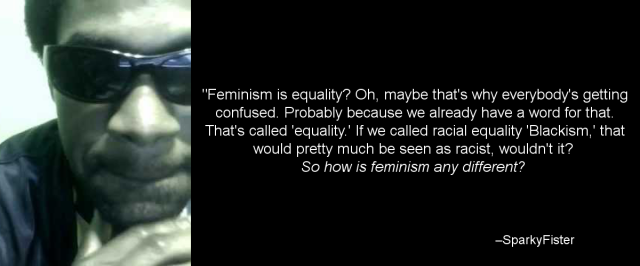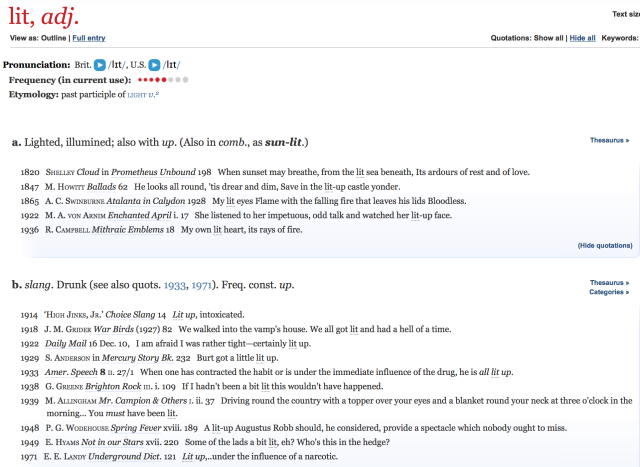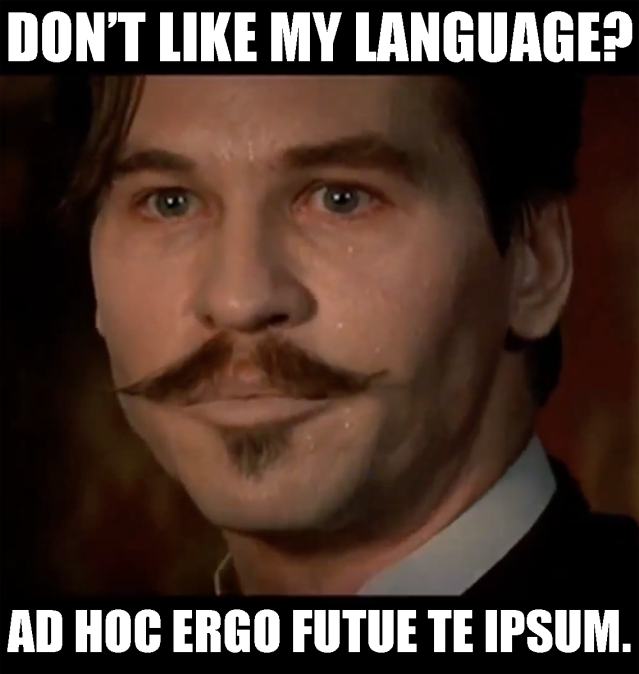As some of you know I have been involved in an argument on Twitter with one DrJ (@DrJ_WasTaken) concerning the usage of the term “fish.” It began when he asserted that Geoffrey Chaucer was using the word “fish” (or “fissh”) wrongly, because Chaucer includes whales under the term “fish.”
I pointed out something I took to be something very obvious, that correctness and incorrectness in word usage is conventional, and is therefore contextual and relative to the community of language speakers of which one is a part. The fact that many modern English speakers would not use the word “fish” in such a way as to include whales merely reflects a change in usage, where popular language has tended somewhat to conform to usage in science, in which whales, being mammals, would not be regarded as “fish.”
Although it is not actually clear that biologists use the word “fish” in any formal sense—”fish” is, at most, a paraphyletic classification, similar to “lizard” and “reptile.” That is to say, it based on phylogenetic ancestry, but includes a couple of arbitrary exclusions. For example, here is a chart of the paraphyletic group Reptilia:

Reptilia (green field) is a paraphyletic group comprising all amniotes (Amniota) except for two subgroups Mammalia (mammals) and Aves (birds); therefore, Reptilia is not a clade. In contrast, Amniota itself is a clade, which is a monophyletic group.
In other words, “reptiles” seem to be defined as “all animals which are descended from the Amniota, with the (semi-)arbitrary exclusion of mammals and birds.”
There was once a Class Pisces, but this is no longer recognized as a valid biological class. Nowadays, the biological use of “fish” seems to refer to three classes: Superclass Agnatha (jawless “fish”; e.g. lampreys and hagfish), Class Chondrichthyes (cartilaginous “fish”; e.g. rays, sharks, skates, chimaeras), and Class Osteichthyes (bony “fish”), but excluding Class Amphibia, Class Sauropsida, and Class Synapsida, although these all belong to the same clade. So “fish”, like “reptile” is a paraphyletic classification. It includes some members of a clade but just leaves some other members out. Here’s a chart:

I think this element of arbitrariness in the biological taxonomic classification of fish is important, and goes to substantiating my point about the flexibility of the usage of the word “fish.” In this case, the point is: the term “fish” even as used in contemporary biology is essentially arbitrary. It involves drawing a line around certain kinds of living beings and saying “These are fish.”
The issue is that DrJ holds the position that, for any given English word, such as “fish,” there is one and only one absolutely correct usage of this word, that this correct usage is completely independent both of all historical context and of actual usage, and that any other usage of the word is, in some absolute way, INCORRECT or WRONG.
Thus, he maintains, that English speakers in Chaucer’s day, including Chaucer, were using the word “fish” wrongly, because they do not use it as modern scientists use it, which is the one, single, eternally correct way—even though, as I mention above, this modern “scientific” usage is essentially an arbitrary paraphyletic grouping.
This position generates what I take to be a number of absurdities, more than sufficient to refute the position by a reductio ad absurdum. For example, it entails that in many cases, and definitely in the case of the word “fish,” whatever English speakers first coined the word “fish,” used the word they had created WRONGLY, the very instant they used it at all. They had just now made a new word to name something, but they were ignorant of the fact that the word which they had just now created, really names something else—their intentions in creating the word notwithstanding.
Now, there are many natural facts about animals, e.g. that whales give live birth and so are mammals. But “the correct name of this animal or animal kind in English” is not a natural fact. I would have said that it is a social fact or a convention (which still seems correct to me). But DrJ denies this. He maintains that there are facts about the correctness of word usage which are neither natural facts nor conventions.
As a Platonist, I am perfectly prepared to admit that there are such facts, non-natural facts, for example, facts of logic or mathematics. Logical facts and mathematical facts are neither natural or physical, because they are about things which are immaterial, nor are they conventional or social, since they are entirely objective. I would not, however, have thought that English word meanings were the sorts of things about which there could be transcendent metaphysical facts outside time and space, not subject to the actual usage and conventions of English speakers. I had always taken it to be obvious that word usage was a convention or social fact.
I have spoken of DrJ’s belief in PLATONIC WORD-MEANING HEAVEN. I intended this term to show (what I take to be) the absurdity of his position, but I want to stress that it is LOGICALLY NECESSARY that he believe in something like this. If the CORRECT meaning of words is determined neither by nature nor by convention, it MUST necessarily have some kind of eternal, transcendent ground beyond convention and outside of nature—if not God, then at least something like Platonic Word-Meaning Heaven. I don’t care what he calls this transcendent ground beyond nature which determines eternal correct word meaning—all that matters to me is that he must believe in such a thing, because whatever it is (and perhaps he knows the one, true, eternally correct name for it?), this is what he is appealing to when he holds there is a standard of correctness for words which is non-conventional and above nature. He cannot be, for example, appealing to the usage of modern biologists, because his claim JUST IS that this usage is eternally correct, and—he has been very clear on this point—it was correct in Chaucer’s day, before any actual English speaker used the word “fish” in this way—which is what enables him to say that Chaucer’s use of “fish” is incorrect, and that the use of “fish” by whichever English speakers who first used the word “fish” was equally incorrect.
We are not debating about HOW the word “fish” is used by modern biologists (although that might be interesting—it’s paraphyletic nature seems to add an ad hoc, arbitrary element, which makes his case that it is the one, true, eternally correct use even more suspect.)—we are discussing the grounds of DrJ’s claim that ONLY the use of the word “fish” by modern biologists is or can be CORRECT, and that any and all other uses, past, present, or future, are, necessarily, INCORRECT or WRONG. It is very clear DrJ is maintaining that correctness in word-usage is in some way an eternal truth comparable to the truths of mathematics and logic. I remain unconvinced by this claim, and have yet to see any good evidence offered for it, beyond a dogmatic insistence that it is so, ad nauseam. But I want to know what his actual arguments are for this Platonic position on word-usage. I am a Platonist, so he’s already got my concession that there are such things as eternal, non-physical, not-temporal standards (e.g. of math, logic, ethics, etc.). I’m just not convinced that word usage is like that. Given the way that words vary among languages and the way they change meaning over time, it seems absurd to me to class word-meanings among the eternal objects—although of course we are forced to speak of eternal entities by means of temporal words, but that’s another story.
My suspicion is that he is continually confusing the USAGE OF A WORD TO REFER to some truth about the world with the REFERENT BEING REFERRED TO IN THE USAGE. That is to say, I think he is doing the equivalent of confusing the natural fact that snow is white with the English sentence “snow is white.” The fact of the color of snow is what it is, regardless of how that fact is EXPRESSED in English. The very same fact can be expressed in German as “Schnee ist weiss.” But the WORDS USAGE which expresses the fact is CONVENTIONAL. Nothing in the fact of snow’s being white in any way entails that the stuff has to be called “snow” or the color called “white.” These are arbitrary sounds that convention has linked with the frozen precipitate that falls from the sky and the color or tint which is a quality of said precipitate.
Plato’s Cratylus is devoted to the question of whether or not there are “true names” for things, or whether names are conventional. Cratylus says there are true names, and Hermogenes holds they are conventional. For SOME MAD REASON the two call upon Socrates to decide the matter—Socrates then proceeds to refute Cratylus and argues him into conceding that words are conventional, and before Hermogenes has time to gloat, Socrates turns on him, refutes him, and argues him into the position that there are true names for things. And with the opponents having switched sides, and the question still unanswered, Socrates leaves. RULE OF LIFE: DO NOT ASK SOCRATES TO “SETTLE” AN ARGUMENT.
Anyway, I have a number of questions for DrJ that still remain unanswered, to wit:
1. What are the reasons for your belief in a transcendent ground which determines CORRECT word usage over and above actual historical usage? Can you demonstrate that such a Platonic realm of word meanings exists? Or that there are transcendent facts about word meaning in the same way or in a similar way that there are transcendent truths about mathematical entities and logical entities?
2. How do you access this transcendent place wherein the one true eternal correct word meanings of English are stored? I would like to know the true, eternally correct meanings of words, so I can use them properly. How do I check which definition is the one, true, eternally correct one? What sort of argument would demonstrate that usage X of a word is the ‘one, true, eternally correct’ one and usage Y is not?
3. If your thesis is true, why don’t linguists, who study language, recognize that it is true? Or if any linguists do maintain that there is one and only one eternally correct usage for any given English word, can you please give me their names? And can you point me to their arguments as to why they think this is true?
4. If your thesis is true, why don’t lexicographers recognize it to be true? Why do dictionaries, at least every one I am familiar with, give more than one definition for some words? Are lexicographers unaware that there is and can be only one true correct meaning for each word? For example, the Oxford English Dictionary says of itself
The OED is not just a very large dictionary: it is also a historical dictionary, the most complete record of the English language ever assembled. It traces a word from its beginnings (which may be in Old or Middle English) to the present, showing the varied and changing ways in which it has been used and illustrating the changes with quotations which add to the historical and linguistic record. This can mean that the first sense shown is long obsolete, and that the modern use falls much later in the entry.
Why does the OED focus on “the varied and changing ways in which [a word] has been used” instead of on the “one, true, eternally correct meaning” of a word? Shouldn’t the one, true, correct meaning be regarded as more important than all the historically incorrect usages? Why does the OED speak as if multiple senses of one word are all valid, if this is (as you say) false? Or again, the OED says
What’s the difference between the OED and Oxford Dictionaries?
The OED and the dictionaries in ODO are themselves very different. While ODO focuses on the current language and practical usage, the OED shows how words and meanings have changed over time.
Why does the OED think that word meanings change over time, when they are, in fact, static and fixed by your transcendent standard of correctness? Why do all dictionaries think this? Why have you not corrected the OED and the various other dictionaries on this extremely important point? Surely, if it is worth taking the time to explain to me on Twitter that words have only one, true, eternally correct meaning, it is worth explaining this to the OED and other dictionaries, so they can change their priorities. Or can you point me to a dictionary whose policy is to give ONLY the one, true, eternally correct definition of each word?
5. If every English word has one, true, eternally correct meaning, does this go in reverse? Does every eternal meaning have only one true word to which in corresponds? Or do you hold that although there is only one, true, eternally correct meaning for each word, there can be arbitrarily many words (e.g. in other languages) that express this meaning? In other words, is “fish” the one, true, eternally correct word to express the one, true eternally correct meaning of “fish,” so that all other languages are wrong to not use the English word “fish”? Is Chaucer’s “fissh” wrong? Is the German “Fisch” wrong? Are they “less wrong” than the French “poisson”? Is it always English words that are correct, so that all speakers of non-English languages are always using all words wrongly, just because they are not speaking the one, true, eternally correct language, English? Or are the true, eternally correct words divided among the various languages of the world?
It brief:
- What is your argument that words have only one, true, eternally correct meaning, such that all other uses are wrong?
- How do you access whatever supernatural eternal ground of word meanings there is wherein you find these eternal standards of correct word use?
- If you are correct, why don’t linguists acknowledge that you are correct?
- If you are correct, why don’t lexicographers acknowledge that you are correct?
- Are you saying that not only does every English word have one, true eternally correct meaning, but that every meaning has one, true, eternally correct word that expresses it?
















